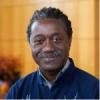FIP Seminar: The Birth and Amazing Life of Nonlinear Optics
This event has passed.
Wed, 11/09/2022 - 12:00 to 13:00

Presenter
Herbert Winful, Ph.D.,University Diversity and Social Transformation Professor, Arthur F. Thurnau Professor, Joseph E and Anne P Rowe Professor of Electrical Engineering, Professor of Electrical Engineering and Computer Science, Professor of Physics and Applied Physics, University of Michigan
The field of nonlinear optics was born at the University of Michigan in 1961 when Franken, Hill, Peters, and Weinreich observed for the first time the generation of optical harmonics. It was indeed a revolutionary act because at the time everyone thought of light as photons and knew that you cannot change the frequency of a photon. That initial observation of frequency doubling of light ushered in the discovery of a plethora of new nonlinear phenomena including optical rectification, third harmonic generation, parametric amplification, self-phase modulation, self-focusing, four-wave mixing, and soliton propagation. Because the optical nonlinearity is fairly weak, the era of nonlinear optics required the invention of the laser, and in particular, the Q-switched laser capable of high peak intensities. Applications of nonlinear optics include the development of new sources of coherent radiation through parametric oscillation and stimulated Raman scattering, the generation of terahertz radiation through optical rectification, the generation of ultra-short pulses through Kerr-lens mode locking, the correction of aberrations through optical phase conjugation, and the generation of entangled photons through parametric down-conversion. Nonlinear optics has made it possible to generate coherent frequency combs that are used in metrology and enable a connection between radio frequencies and optical frequencies. In this talk I review the history, physics, and some of the applications of nonlinear optics.
Herbert Winful is a University Diversity and Social Transformation Professor, the Joseph E. and Anne P. Rowe Professor of Electrical Engineering, Arthur F. Thurnau Professor of Electrical Engineering and Computer Science, and a Professor of Physics at the University of Michigan. He earned a BS degree in electrical engineering from MIT in 1975 and a PhD from the University of Southern California in 1981. After six years as a Principal Member of Technical Staff at GTE Laboratories in Waltham, Massachusetts, he joined the University of Michigan in 1987 as an associate professor of electrical engineering and computer science and was promoted to full professor four years later.
His contributions to photonics and quantum electronics include pioneering work on nonlinear optical periodic structures, the nonlinear dynamics of coherently-coupled laser arrays, the physics of quantum tunneling time, polarization instabilities, and distributed-feedback fiber Raman lasers.
Professor Winful is a Life Fellow of the Institute of Electrical and Electronics Engineers, and a Fellow of the American Physical Society, Optica (the Optical Society of America), and the National Society of Black Physicists. His many awards include the State of Michigan Teaching Excellence Award, the Harold R. Johnson Outreach and Diversity Award, and the 2020 IEEE Photonics Society Quantum Electronics Award.
